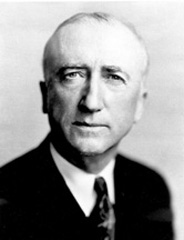SS General and specialist in anti-partisan operations who served as senior SS and police chief of Army Group Center area on the Eastern Front during 1941-42 and later suppressed the Warsaw rising in 1944; sentenced to ten years' effective house arrest from which he was released early in 1958; was rearrested and retried on charges associated with his wartime activities, anf finally sentenced in 1962 to life imprisonment for murders committed during the mid-1930s.
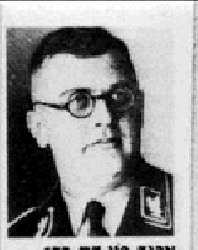
one of the best-known British airmen of World War II; combined considerable skill with a legendary triumph over disability to regain entry into the RAF, despite having lost both legs in a flying accident, and then to lead a fighter squadron in the Battle of Britain from June 1940; was highly successful in command of 12 Group Wing, was involved in arguments with Fighter Command over his controversial 'big wing' fighter formation technique, which ignored the defensive doctrines prevalent in Fighter Command at the time; was captured in August 1941 after a mid-air collision with an enemy aircraft; his notoriety assured him respectful treatment by the Germans, who even consented to an RAF parachute drop to bring a new set of artificial legs.
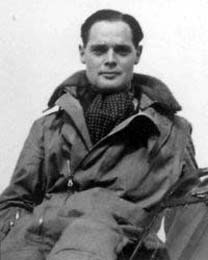
soldier and premier of the first post-Fascist government in Italy, signed the Italian treaty of unconditional surrender to the Allies on September 28, 1943; served as an artillery officer in the Italian colonial wars and as a colonel during World War I; an opponent of Mussolini's regime from the outset, accepted an appointment as Field Marshal in 1926 and subsequently went as Mussolini's Governor to Libya (1928-34); later commanded Italian forces in the war against Abyssinia during 1935 and served briefly as its Viceroy in 1936; his collaboration with Mussolini ended, however, in 1940 on Italy's entry into the war; resigned as Chief of Staff four months later, following Italy's disastrous invasion of Greece; a conspirator against Mussolini from 1942, was called upon by King Victor Emmanuel to head the new government following the Fascist Grand Council's decision to depose Mussolini in July 1943; during negotiations with the Allies over Italy's capitulation and the planning of the Allied invasion of Italy, the position of his government remained untenable, attempting to seed terms from the Allies intent on unconditional surrender and increasingly threatened by Germany's reinforcement of mainland Italy (while Hitler personally planned the dramatic rescue of Mussolini from Gran Sasso and his establishment at the head of a puppet republic); finally, at Cassibile on September 3, 1943 General Castellano signed the secret armistice on his behalf which provided for the unconditional surrender of all Italian forces and the establishment of an Allied administration in Italy; by declaring war on Germany shortly afterwards, on October 13, was able to resolve the ambiguity of his government's position and smooth Italy's path after Germany's surrender, which he now believed was inevitable; also secured Soviet recognition of his government in March 1944 by winning the support of Palmiro Togliatti, leader of the Italian Communist Pary; resigned andwas succeeded by Ivanoe Bonomi after the Allied capture of Rome in June 1944.
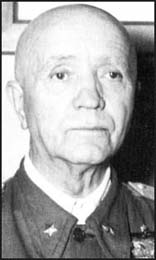
veteran of the Russian Imperial Army, and graduate of the French Military Academy in 1934, was appointed Deputy Chief of Staff of Operations for the Kiev Military District in 1938; in 1941 was Chief of Staff of the Soviet Southwest Front under General Kirponov; later commanded the 10th Army at Kursk, Bryansk and Kiev. in November 1941, was promoted general and replaced General Yeremenko as Commander of the 1st Baltic Front; forces under his command subsequently took Riga and encircled German Army Group North at Memel; at the end of the war, was appointed Commander of the Baltic Military District and became a Marshal of the Soviet Union.
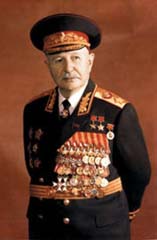
veteran Italian Army officer, was appointed C-in-C of Axis forces in Libya in July 1941, in which capacity was Rommel's official superior, had little success imposing his often defensive orders on the aggressive German general, who tended to treat them as 'advice' and usually appealed to higher authorities if he disagreed; in June 1942 Rommel was made a Field Marshal answerable directly to Rome but in Novemnber the newly promoted Bastico regained nominal control, charged with preventing the Afrika Korps from retreating into Tripolitania; in fact, by February 1943 Rommel had retired west beyond Tripoli, which led an incensed Mussolini to recall Bastico to Italy.
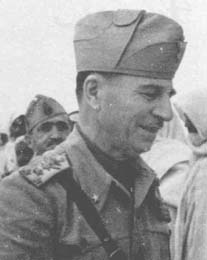
president of the Czech government-in-exile during the war; forced to resign under pressure from Adolf Hitler after the 1938 Munich Pact that carved up his country and gave the Sudetenland to Germany and left for France; after Nazis occupied all of Czechoslovakia in 1939, formed the Czech National Committee in Paris, moving it to London in 1940; promoted the formation of Czech army and air units within the British armed forces; the British recognized his provisional government in 1941, as did all the Allies in 1942; returned to Czechoslovakia after the war where he was elected president by the parliament in 1946; resigned, however, in 1948 as Communist pressure eventually drove Czechoslovakia into the Soviet Sphere of influence.

a nephew of King Gustav V; was vice chairman of the Swedish Red Cross Committee which enabled him to arrange prisoner exchanges between Britain and Germany; negotiated with Nazi SS chief Heinrich Himmler in 1945; forwarded peace proposals to the Allies which were rejected; was assassinated by Jewish extremists in Palestine in 1948 while on a peacekeeping mission for the United Nations.
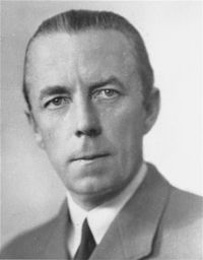
successor to Yezhov as Chief of the Soviet Secret Police, the NKVD, from 1938 until his death, also becam a member ot the five-man State Defense Committee at the outbreak of the war, and provided Stalin with information on the Armed Forces throughout the period; under him, the NKVD carried out a variety of wartime duties and gained a reputation for almost unsurpassed brutality; its main tasks included large-scale purges in annexed territories, deportation of minority nationalities, control of Soviet partisans and POW camps, and counter-intelligence; an enemy to many people, did not long outlive Stalin; circumstances of his death in 1953 were never clarified.
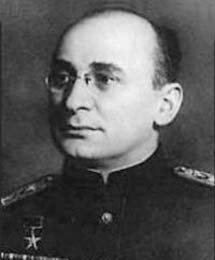
married to Princess Juliana, the heir to the Dutch throne; fled to London in 1940; flew for the Royal Air Force; coordinated the Dutch resistance movement; reorganized the Dutch intelligence service, became commander in chief of the Dutch armed forces in 1944; secretly returned that year to the Netherlands to organize resistance groups.
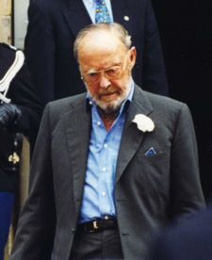
American Attorney-General in President Roosevelt's cabinet from September 1941; during 1940, as Solicitor-General, had been in charge of the operation of the American Alien Registration Act (passed in June 1940 to regulate the status of three and a half million foreign nationals in the US) and had earned a considerable reputation for his wise and moderate approache to this enormously difficult and sensitive task; his protests (which were ignored) against the evacuation of American citizens of Japanese origin and his efforts, which were totally successful, to secure the removal of Americans of Italian origin from the category of enemy aliens, established him as a firm defender of civil liberties; as Attorney-General, continued his commitment of the just treatment of American citizens of foreign origin, setting up an inter-departmental committee on investigations to improve procedures for the investigation of sedition and forbidding prosecutions for sedition without his personal authority; after the war, was appointed by President Truman (who had initially asked for his resignation) to join the International Military Tribunal, which tried war criminals at Nuremberg until 1948; here also, made a significant contribution, consistently noted for his magnanimity and unequivocal sense of justice; wrote an autobiographical account of many of the important issues of the period in a book entitled In Brief Authority.
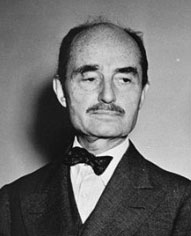
Australia's most important wartime commander; Chairman of the Australian Manpower Committee at the outbreak of war, his appointment to command of Australian land forces in 1940 surprised most Australians; his rough, tactless manner and interest in his own aggrandizement, however, were combined with considerable experience in staff work and an ability for administration, developed during World War I; despite his competitiveness towards rivals and his inability to delegate, appeared the only practical choice at the time; his lack of combat experience, however, and more particularly the mistakes caused by the monomaniacal exercise of his power at critical moments, was to cause considerable suffering to troops under his command; called to take command of Australia's Imperial Force, raised for service in the Middle East in 1940, held a series of posts in rapid succession; promoted Lt General in April 1941 and second-in-command to General Wavell, directed Australian and New Zealand troops in the fighting and the evacuation of Greece; posted again to the Middle East, went to Alexandria to take up his post as Deputy C-in-C Middle East under General Auchinleck; the appointment, merely a conciliatory gesture toward the Dominion forces, carried little real power, and a rift soon developed between him and Auchinleck; recalled to Australia with two divisions after Pearl Harbor, was promoted Commander of Allied land forces in Australia under Supreme Commander MacArthur, and faced with the task of preparing the under-trained and under-equipped Australian forces for battle in the Pacific theater; more difficult, even, than thes practical considerations were the political complexities of his command; receiving General MacArthur more or less direct from Corregidor in Marh 1942, as the Supreme Allied Commander of the newly-activited Southwest Pacific command, had no choice but to accept the effective takeover of Australian strategic planning by MacArthur; Prime Minister Curtin's ready acceptance of MacArthur's dominance in the military sphere galled and frustrated the Australian General, whose main interest remained with his own position; in September 1942, arrived in Port Moresby to direct the difficult jungle operation which pushed the Japanese forces back along the Kokoda trail to Buna, and achieved a hard-won victory in Papua; exercised personal field command between September 1942 and January 1943, supervising the recapture of Buna, taken on December 9, 1942; returning to Australian Army HQ in early 1943, as the focus of fighting shifted to the north and numbers of Australian troops in the area reduced, his control of Allied land forces was subsequently undermined by the arrival of Lt General Krueger to lead US land forces, under direct command of MacArthur; from this point, MacArthur's desire to reduce the significance of his Blamey's role, and indeed the role of Australian forces in the Southwest Pacific theater, remained a consistent theme of his strategy and deployments; despite American criticism of his leadership, retained his position until the end of the war.
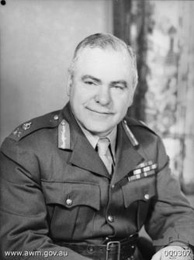
commanded the German Eighth Army during the Polish campaign; was Commander in Chief East in Poland for a short period of time; was promised a role in the invasion of France but was not employed in the invasion because of repeated complaints against the actions of the SS in Poland; transferred to command of 9th Army in the west; in June 1940 became Military Governor of Northern France and held this position until October 1940 when he was transferred to the command of the First Army; retained this post until May 1944 when he was named commander in chief of Army Group G; was relieved of command of Army Group G in late September 1944 after officially protesting about SS atrocities in Poland, and reinstated on 24 December 1944; was appointed commander in chief of Army Group H; this command was redesignated in early April 1945 and became Commander in chief in the Netherlands; on May 5 was summoned to the Hotel de Wereld ('The World Hotel') in Wageningen by General Charles Foulkes (commander in chief of the Canadian liberation army) to discuss the surrender of the German forces in the Netherlands; Prince Bernhard, acting as commander in chief of the Dutch Interior Forces, attended the meeting as well where Blaskowitz agreed with all proposals by Foulkes; was charged with war crimes and tried before a U.S. military court in the High Command Trial, but committed suicide during the trial on February 5, 1948 by jumping out of a window of Nuremberg prison.
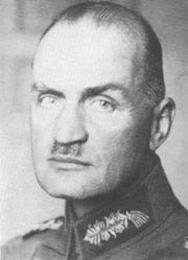
German General of a traditional Prussian military family and described as 'gaunt and hard-bitten' by comtemporaries, commanded Army Groups in Poland in 1939, in the Western Offensive in 1940 and on the Eastern Front from 1941; made Field Marshal after the capitulation of France, was later relieved of his command in the purge of the German High Command that followed the successful Russian counteroffensive at Moscow in December 1941; briefly reinstated to replace Field Marshal von Reichenau as commander of Army Group South in January 1942, was again dismissed in July and never re-employed; was killed in an air raid near Kiel in May 1945.
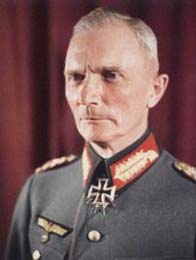
Evangelical Protestant theologian who maintained constant opposition to Nazism; both his father and brother were committed anti-Nazis; after a period of studying and working in New York and London (1930-35), returned to Germany to work with the non-Nazi Confessional Church; met and worked with many prominent members of the German opposition to Hitler, including General Beck, Hans Oster, Admiral Canaris and members of the Kreisau Circle; Between 1939 and 1943 also made attempts to establish contacts with Britain and the US, although these foundered, as had others, on Allied suspicion and the demand for Germany's unconditional surrender; was arrested in April 1943 by the SD with Dohnanyi and others, held at Buchenwald and finally executed at Flossenburg concentration camp in April 1945.
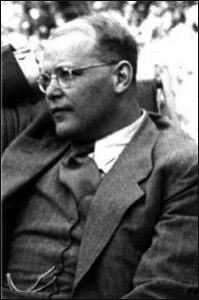
Senior Nazi Party figure and head of Hitler's secretariat; a post World War I Freikorps member, joined Thuringian Nazi Pary in 1925 after serving a prison sentence for murder, and became Gauleiter in Thuringia in 1928; in the same year his fund-raising skills brought him promotion as party treasurer; from this time on stayed close to Hitler, though kept a low profile; among Hitler's entourage ranked next to Deputy Führer Hess; when Hess flew to Britain in 1941, was promoted Party Minister in charge of Pary Headquarters, and from this position was able to control access to Hitler, sometimes blocking contact even with Göring, Goebbels, Himmler and Speer; ambitious for power even in the last days of the Reich, followed Hitler in his retreat to the Bunker, witnessing Hitler's will and marriage, attempting to order Göring's execution, and finally sending Dönitz news of his succession as F¨hrer; was never seen alive after the breakout of Hitler's staff from the Bunker, although persistent rumors have placed him in several countries,usually in South America; the discovery of a skull identified as Bormann's and the subsequent official declaration of his death by the West German government in 1973 represents perhaps the natural desperation of German leaders to stem the disruption of German political life caused by 'Nazi hunts', rather that a conclusive belief that the skull was Bormann's.
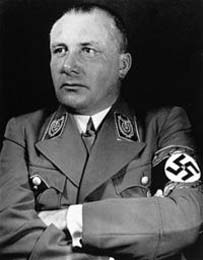
Indian Nationalist leader who had been jailed several times by the British since his rejection of the independence movement led by Mohandas Gandhi; saw the outbreak of the war as an opportunity to accelerate the expulsion of the British from India; after escape from imprisonment in India in 1940, managed to reach Berlin, where he organized a small body of Indian volunteers to fight the Allies; following Japan's entry into the war, went to Tokyo to announce the establishment of a Provisional Government of Free India and an Indian National Army, recruiting a reasonably large force from Indian Army troops captured during the Malayan campaign; though he subsequently led some of his troops in the Japanese offensives at Kohima and Imphal in 1944, the defeat of the Japanese ended his own hope of success; died in a plane crash in 1945.
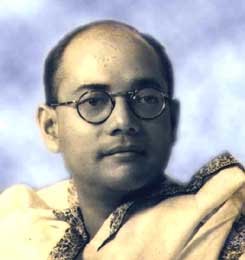
highly successful American Army Group Commander whose considerable reputation as a strategist and leader was largely forged during the fighting in France in 1944 and 1945, though he had originally been picked out of relative obscurity and without combat experience to serve under Generals Eisenhower and Patton in North Africa; here he replaced Patton (who whent to command the 7th Army) as the commander of the US II Corps for Allied operations in Tunisia during the spring of 1943; on the basis of his combat record here and subsequently during the invasion of Sicily, was appointed to command the American landings in Normandy on D-Day, June 6, 1944, under the overall command of General Montgomery; in command of the American 1st Army landings on the Omaha and Utah beachheads, directed the consolidation and then breakout of his forces through the Mortain-Avranches gap into central France; in command of the one and a quarter millioin men of 12th Army Group from August 1, directed key operations against the West Wall, in the Ardennes and over the Rhine; it is a measure of his considerable qualities and popularity as a military leader that he was able to achieve consistent success with such a vast command; much decorated after the war, remained best known as the 'GI's General' and received perhaps his greatest acknowledgements from the troops who served under him.
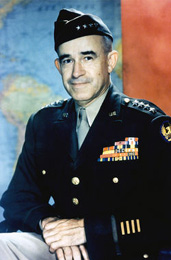
Hitler's chosen successor to Fritsch as German Army C-in-C (OKH) in 1938, oversaw successful operations in Poland, Denmark, Norway, the Netherlands, Belgium France and the Balkans between 1939 and 1941, despite his opposition to Hitler's initial proposal for an offensive in the west and General von Manstein's plan for the conduct of the campaign; although Generals Beck and Halder and other professional staff officers sought his support against Hitler's war policies, there is no evidence that he was prepared, after this initial protest, to resist the established power in the Third Reich; promoted Field Marshal following the capitulation of France in June 1940, was subsequently made principal scapegoat for the German failure to capture Moscow in 1941 and replaced as C-in-C by Hitler himself; was never recalled to active service and died before the start of his trial for war crimes in 1948.
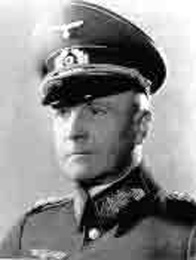
American General notable for his commitment to Allied and inter-service sooperation, held USAAf commands in the Pacific, North Africa and Europe and had served under General Billy Mitchell, a controversial theorist of aerial warfare, during World War I; Commander of Far East Air Force in the Philippines under General MacArthur when America entered the war, presided over the disastrous loss of American B-17 bombers, his main strike force, destroyed on the ground at Clark Field, Luzon, on the first day of the Japanese attack on the Philippines; responsibility for the loss, however, is widely attributed to General MacArthur, who continued to stall Brereton's pleas to get his force into the air while awaiting further intelligence; in command of the newly formed 10th Air Force in India from February to June 1942, was transferred to command the Middle East Air Forces; here he quickly earned the respect of British colleagues, working successfully in cooperation with the RAF, and, in an early venture in Allied integration, taking command of the US Desert Air Force for the El Alamein offensive; in 1942 accepted command of the newly designated US 9th Air Force which played a vital role in the Allied campaigns in North Africa, Sicily and Italy, including the attack on the Ploesti oil refineries on August 1, 1943; both before and after the Allied invasion of Northwest Europe, his 9th Air Force was indispensable to the Allied effort as one of the most effective tactical units in operation, raiding selected targets in northern France designed to disrupt the German communications system; accepted an appointment in August 1944 as first Commander of the 1st Allied Airborne Army which fought at Arnhem in September.
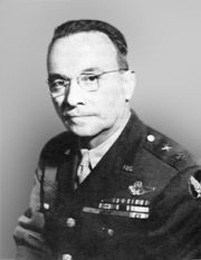
successor to Sir John Dill as British Chief of the Imperial General Staff in 1941, and Chairman of the Chiefs of Staff Committee from June 1942, was widely regarded as one of Britain's most able strategists and field generals, and played a crucial part in the day-to-day running of the war, providing the British Chiefs of Staff with a clear and cohesive leadership; in 1940, as commander of the II Corps, BEF in France, was instrumental in directing the defensive actions which secured the escape of the BEF from Dunkirk; briefly appointed C-in-C Home Forces before replacing Dill as CIGS, became Churchill's principal strategic adviser and one of the few military chiefs who was able to influence and contain Churchill's somewhat impetuous and grandiose approach to military strategy; in the face of considerable pressure, maintained good relations with both Churchill and most American military leaders throughout the war, though the mutual antipathy fet by Brooke and US General George Marshal was a regular feature of the sometimes strained relationships among the Allied Combined Chiefs of Staff.
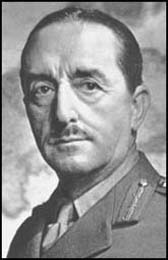
British C-in-C of all land and air forces in Hong Kong, Malaya and British Borneo at the time of the Japanese entry into the war, had been recalled from retirement begun in 1937, when he became governor of Kenya, to comman British forces in the Far East, though his replacement, Lt-Gen Pownall, had already been appointed when Japanese forces invaded Siam, as a preliminary to the invasion of Malaya in December 1941; returned to England on December 27.
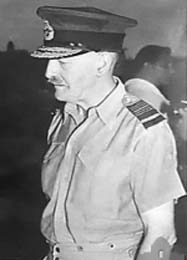
commander of the Soviet armies on the Southwest Front in 1941 when they suffered their most devastating defeats; in 1935, having commanded the 1st Soviet Cavalry Army since 1920, became one of five marshals of the Soviet Union who were created in that year; was one of only two marshals (the other Voroshilov) to survive Stalin's purges of the Russian officer corps in 1938; owing his prominence largely, it seems to his friendship with Stalin and his reputation as an old-school cavalry commander, was appointed a member of Stavka and commander of the Southwestern Front in the Ukraine in July 1941; this sector of the front was given priority in supplies and reinforcements by Stalin, who was determined to hold Kiev at all costs; with overwhelming numerical superiority, but with no ability in modern generalship, was utterly outclassed by German commanders von Rundstedt and von Kleist; in his disastrous defense of Kiev and Uman, lost one and a half million men, and was force to abandon Kiev; ordered, along with his commissar Khrushchev, to evacuate industry in the Ukraine, was responsible for the destruction of the Dniepr dam at Zaporozhe; replaced by Timoshenko on September 13, was sent to the Reserve Front and bacame Commander of the Soviet Cavalry in 1943.
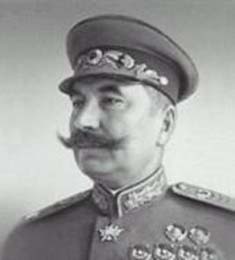
Premier of the Soviet Union during the 1950s, began his career in the Cheka ( the Soviet secret police later replaced by the NKVD); as political marshal, was a member of the Stavka, detailed to oversee the activities of the front-line generals; sent first to the Center Front commanded by Timoshenko, later partipated in the investigations into the failure of Kurochkin's Northwest Front and then went to the West Front, where he sat as a member of the Military Council there with Generals Kovev and Sokolovsky; was promoted Colonel General in 1944 and was sent as representative to the Soviet-sponsored Lublin Committee in Poland; later served as Deputy People's Commissar of Defense, 1944-6.
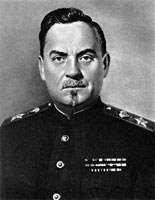
able commander of US Navy destroyer squadrons operating in the South Pacific during 1943 and 1944, developed a distinctive strategy for the independent use of destroyers in night actions; served first in the Solomon Islands and then as commander of Destroyer Squadron 23 (Little Bavers) covering the American landings on Bougainville and New Guniea and fighting actions to prevent the Japanese reinforcement of the islands; from March 1944, served as chief of staff to Vice Admiral Mitscher, comander of Fast Carrier Task Force 58, and was Mitscher's chief aide in the Marshalls, Marianas, Leyte, Iwo Jima and Okinawa campaigns; after the war was given appointments in Washington, the Mediterranean and Korea, and served as Chief of Naval Operations form 1955 to 1961.
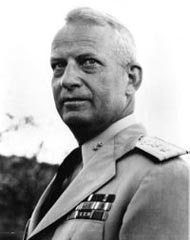
US Senator and close friend of Franklin Roosevelt, was active in pressing for the Cash and Carry Arms Act to increase aid to Britain at the start of the war and subsequently helped steer the passage of the Lend-Lease and Selective Service Acts through Congress; appointed first director of the newly created Office of Economic Stabilization (later changed to the Office of War Mobilization) in October 1941; became chief planner and director of the American wartime economy; from 1943 his successful, if sometimes unpopular, policies to hold down inflation and stimulate war production made him an increasingly influential advisor ot Roosevelt, who took Byrnes with him to the Yalta Conference in 1945; after Roosevelt's death, resigned but was later recalled by President Truman to succeed Edward Stettinius as Secretary of State (July 1945) participating in the Potsdam and london post-war conferences as well as at the Paris Peace Conference; was a firm advocate of the use of the atomic bomb against Japan in August 1945; his contributions to the European peace included the establishment of the UN Atomic Energy Commission; resigned his office in January 1947 and was succeeded by General George Marshall.
